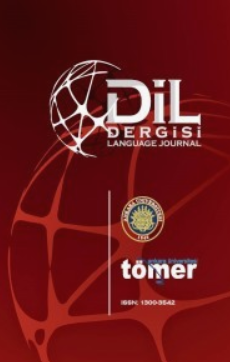JAPONCADAKİ “KOKORO GA HARERU”, “MUNE GA HARERU” VE “KI GA HARERU” DEYİMLERİ ÜZERİNE BİR ARAŞTIRMA
A RESEARCH OF JAPANESE IDIOMS “KOKORO GA HARERU”, “MUNE GA HARERU” AND “KI GA HARERU”
Author(s): Gonca VaroğluSubject(s): Theoretical Linguistics, Lexis, Semantics, Comparative Linguistics
Published by: Ankara Üniversitesi TÖMER
Keywords: Japanese; Idioms; Kokoro; Mune; Ki;
Summary/Abstract: Idioms fuctoning importantly in terms of reflection of the language perception, are basic components of language informing us about people’s worldview, way of thinking, traditions and beliefs. When considered from this point of view, it would be appropriate to say idioms including cultural values and social characterictics in them, function as the culture’s perception memory. In this study, the idioms, which mean according to the dictionaries "relaxation, find peace","kokoro ga hareru", "mune ga hareru" and "ki ga hareru" are discussed. In previous research about the idioms "kokoro ga hareru" and "mune ga hareru", it was understood that the idiom "kokoro ga hareru" was mostly used by the Japanese native speakers (Varoğlu, 2016: 366-373). In this study, the idiom "ki ga hareru" with the same meaning as "kokoro ga hareru" and "mune ga hareru" are also included in the research. The aim of this study is to reveal that if these idioms, which seem to have similar meanings, can be used instead of each other or not and to find out among which one or which ones of these three idioms are more used by Japanese native speakers in daily life. For this purpose, interview was carried out with 40 Japanese native speakers who aged between 30~70 and all university graduates. As a result of the interviews, it was understood that the idiom mune ga hareru is not well known and not used by native speakers although it is included in the dictionaries, the idioms kokoro ga hareru and ki ga hareru are used in almost equal proportions and have similar meanings.
Journal: Dil Dergisi
- Issue Year: 172/2021
- Issue No: 1
- Page Range: 30-42
- Page Count: 13
- Language: Turkish

